Fox News Flash top headlines for April 29
Fox News Flash top headlines are here. Check out what's clicking on Foxnews.com.
Get all the latest news on coronavirus and more delivered daily to your inbox. Sign up here.
The sister of top Manhattan ER doctor Lorna Breen — who committed suicide after working on the front lines of the coronavirus battle — said she believes contracting the illness “altered her brain.”
Jennifer Feist told NBC’s “Today” that her 49-year-old sister, who caught COVID-19 herself before returning to work at New York-Presbyterian Allen Hospital, was haunted by the disease and her inability to help more people.
“She had COVID. And I believe that it altered her brain. Then she went back to the most horrific, unimaginable conditions,” Feist said in an interview set to air Thursday.
HOW CORONAVIRUS MAY AFFECT FUTURE OF AMERICAN JOBS
“For somebody whose life’s calling is helping people, and she just couldn’t help enough people, the combination was just untenable.”
The late doctor kept pulling long hours and was set on saving as many lives as she could.
“She had 12-hour shifts,” said Feist. “When she finished, she said, ‘I can’t leave. Nobody’s leaving. I have to stay and help.'”
Feist said she begged her sister to take better care of herself, but she wouldn’t give up on battling the disease and it eventually “broke” her.
POLICE INVESTIGATING CASE OF ARIZONA MAN WHO DIED AFTER INGESTING FISH TANK CLEANER
“I kept telling my sister, you know, ‘You can’t — if you can’t function, you can’t help anybody. You have to sleep. You have to rest.’ And she just didn’t want to give up,” said Feist.

Emergency room doctor Lorna Breen
“She would not give up. She would not let it break her, which, of course, it did.”
A close pal of the doctor has told The Post that “it broke her” when she returned to work after catching the coronavirus and was told she still wasn’t well enough to return to work and instructed to go back home.
CLICK HERE TO GET THE FOX NEWS APP
She took her own life Sunday while staying with family in Charlottesville, Va. Her death came two days after rookie Bronx EMT John Mondello fatally shot himself.
Experts have told The Post that their deaths could be just the tip of the iceberg for the mental-health fallout among health care workers battling the virus.
CLICK FOR MORE FROM THE NY POST










































